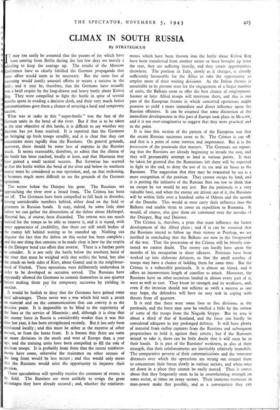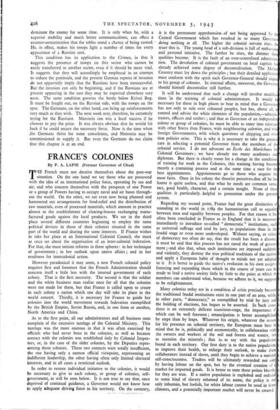CLIMAX IN SOUTH RUSSIA
By STRATEGICUS
T may too easily be assumed that the paeans of joy which have been coming from Berlin during the last few days are merely a histling to keep the courage up. The results of the Moscow nference have so clearly falsified the German propaganda that some offset would seem to be necessary. But the same line of easoning would justify unusual efforts to secure a success in the eld ; and it may be, therefore, that the Germans have actually on a brief respite by the long-drawn and heavy battle about Krivoi og. They were compelled to fight the battle in spite of several onths spent in evading a decisive clash, and their very much better communications gave them a chance of securing a local and temporary success.
What was at stake in this " super-battle " was the fate of the German units in the bend of the river. But if that is to be taken as the true objective of this battle, it is difficult to say whether any decision has yet been reached. It is reported that the Germans are bringing up fresh troops steadily, and it is clear that they can oncentrate more rapidly than the Russians. On general grounds, moreover, there should be some loss of impetus in the Russian attack. It seems reasonable, therefore, to admit that the climax of he battle has been reached, locally at least, and that Manstein may have gained a small tactical success. But Sertorius has warned us that the battle within the bend of the river and below its southern course must be considered as one operation, and, on that reckoning, it becomes much more difficult to see the grounds of the German optimism.
The sector below the Dnieper has gone. The Russians are approaching the river over a broad front. The Crimea has been cut off. The Germans have been compelled to fall back in disorder, leaving considerable numbers behind, either dead on the field or prisoners in Russian hands. It may, indeed, be. some little time before we can gather the dimensions of the defeat about Melitopol. Material has, of course, been discarded. The retreat was too much harried for the troops to be able to remove it, and it is stated, with
7 every appearance of credibility, that there are still small bodies of the enemy left behind waiting to be rounded up. Nothing can disguise the fact that the defeat on this -sector has been complete ; and the one thing that remains to be made clear is how far the respite in the Dnieper bend can offset that reverse. There is a further point r to consider. It is not only the battle below the southern bend of the river that must be weighed with that within the bend, but also the attack on both sides of Kiev, about Gomel and in the neighbour- hood of Vitebsk. These operations were deliberately undertaken in order to be developed as occasion served. The Russians have repeatedly allowed the Germans to commit themselves in one quarter before making them pay for temporary successes by yielding in another.
It would be foolish to deny that the Germans have gained some local advantages. There never was a.war which laid such a strain on material and on the communications that can convey it to the decisive point. It is impossible to be blind to the superiority of the lines at the service of Manstein ; and, although it is clear that the enemy force in Russia is considerably weaker than it was this dine last year, it has been strengthened recently. But it has only been reinforced locally ; and this must be either at the expense of other sectors, or from the home front. It is known that there are some 40 more divisions in the south and west of Europe than a year ago, and the training units have been compelled to fill the role of garrison troops. It is probably from these that the recent reinforce- ments have come, otherwise the resistance on other sectors of the long front 'would be less secure ; and that would only mean that the Russians would seize the opportunity to improve their Position.
These speculations will speedily receive the comment of events in the field. The Russians are most unlikely to resign the great advantages they have already secured ; and, whether the reinforce-
ments which have been thrown into the battle about Krivoi Rog have been transferred from another sector or been brought up from the rear, they are suffering heavily, and they create opportunities elsewhere. The position in Italy, slowly as it changes, is already sufficiently favourable for the Allies to take the opportunity to employ more of their waiting divisions. As the Italian theatre is unsuitable in its present state for the engagement of a larger number of units, the Balkans seem to offer the best chance of employment. Sooner or later Allied troops will intervene there, and this is one part of the European theatre in which concerted operations might promise to yield a more immediate and direct influence upon the Russian offensive. It can be assumed that some discussion of the • immediate developments in this part of Europe took place in Mcscow, and it is not over-imaginative to suggest that they were practical and to the point.
It is into this section of the pattern of the European war that the recent Russian successes seem to fit. The Crimea is cut off; and that is a point of some interest and importance. But it is the possession of the peninsula that matters. The Germans are report- ing that the Russians are already beginning to invade the east, and they will presumably attempt to land at various points. It may be taken for granted that the Rumanians left there will he expected to fight to the end, to deny the use of its sea and air bases to the Russians. The suggestion that they may be evacuated by sea is a mere recognition of the position. They cannot escape by land, and it is putting the initiative of the Russian fleet too low to think that an escape by sea would be any jest. But the peninsula is a very valuable base, and when the enemy are driven out of it, the Russians will be within little over a hundred miles of Odessa and the mouth of the Danube. This would at once carry their influence into the Balkans and enable them to cover an expedition to Rumania. It would, of course, also give them air command over the mouths (4 the Dnieper, Bug and Dniester.
The Crimea is, therefore, a prize that must influence the future development of the Allied plans ; and if it can be assumed that the Russians intend to follow up their victory at Perekop, we are justified in concluding that the Balkans are now in the foreground of the war. That the possession of the Crimea will be bitterly con- tested we cannot doubt. The enemy can hardly have spent the months of his occupation in sheer idleness. Positions have been worked up into elaborate defences, so that the small number of troops may have a chance of holding them for some time. But the Crimea is a vulnerable peninsula. It is almost an island, and it offers an inconvenient length of coastline to attack. Moreover, the Russians have on other occasions landed in almost every part of it, west as well as east. They know its strength and its weakness, and, even if the invasion should not achieve as swift a success as one may hope, the defenders will have no easy task in coping with threats from all quarters.
It is said that there were some four or five divisions in the peninsula, and the force may now be swelled a little by the retreat of some of the troops from the Nogaisk Steppe. But its area is about a third of that of Scotland, and the force can hardly be considered adequate to any prolonged defence. It will have plenty of material from earlier captures from the Russians and subsequent preparations to hold it. against their return ; but if the Russians intend to take it, there can be little doubt Mit it will soon be in their hands. It is part of the Russians' weakness, as also of their strength, that their reinforcements are inevitably relatively immobile. The comparative poverty of their communications and the immense distances over which the operations are strung out compel them to concentrate their forces slowly in various sectors, and when once set down in a place they cannot be easily moved. Thus it comes about that they frequently seem to be in overwhelming strength on some sector, at times on many sectors. Their immense resources in man-power make that possible, and as a consequence they can dominate the enemy for some time. It is only when he, with a superior mobility and much better communications, can effect a counter-concentration that the tables stand a chance of being turned. He, in effect, makes his troops fight a number of times for every appearance of a Russian unit. This condition has its application to the Crimea, in that it suggests the presence of troops on this sector who cannot be easily transferred to another sector, even if it should be more vital. It suggests that they will accordingly be employed in an attempt to reduce the peninsula, and the present German reports of invasion do not apparently imply that the Russians have been unsuccessful. But the invasion can only be beginning, and if the Russians are at present appearing in the east they may be expected elsewhere very soon. The same condition governs the battle below Krivoi Rog. It must be fought out, on the Russian side, with the troops on the spot. The Germans, on the other hand, can bring up reinforcements very much as they wish. The next week may, therefore, be extremely trying for the Russians. Manstein can win a local success if he chooses to pay the price. It was always obvious that he would hit back if he could secure the necessary force. Now is the time when the Germans thirst for some consolation, and Manstein may be commissioned to supply it. But even the Germans do not claim that this chapter is at an end.



























 Previous page
Previous page